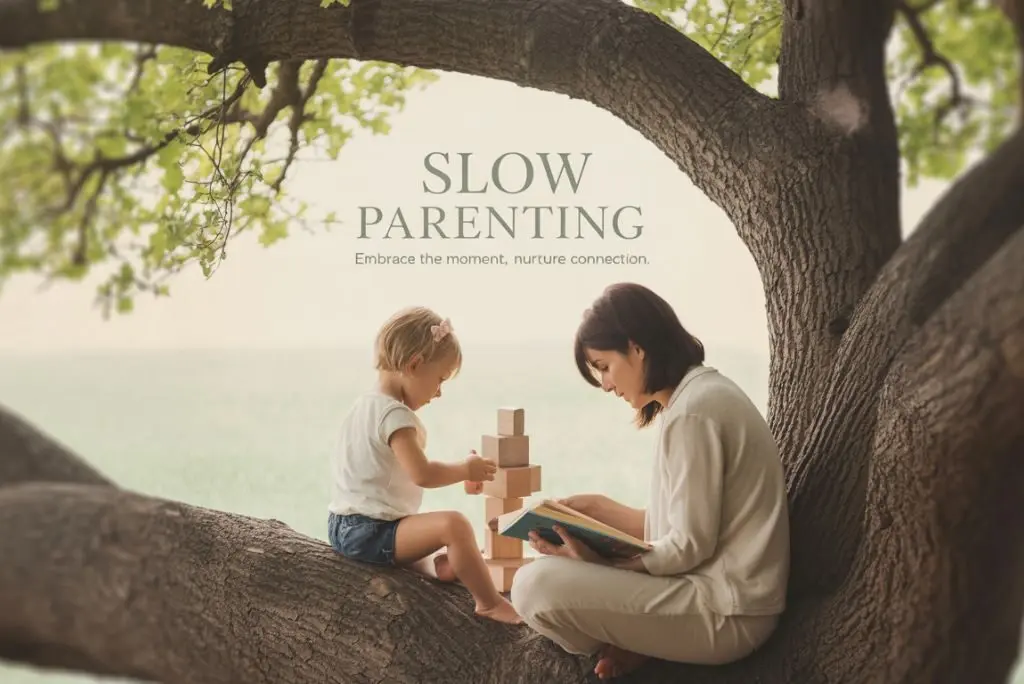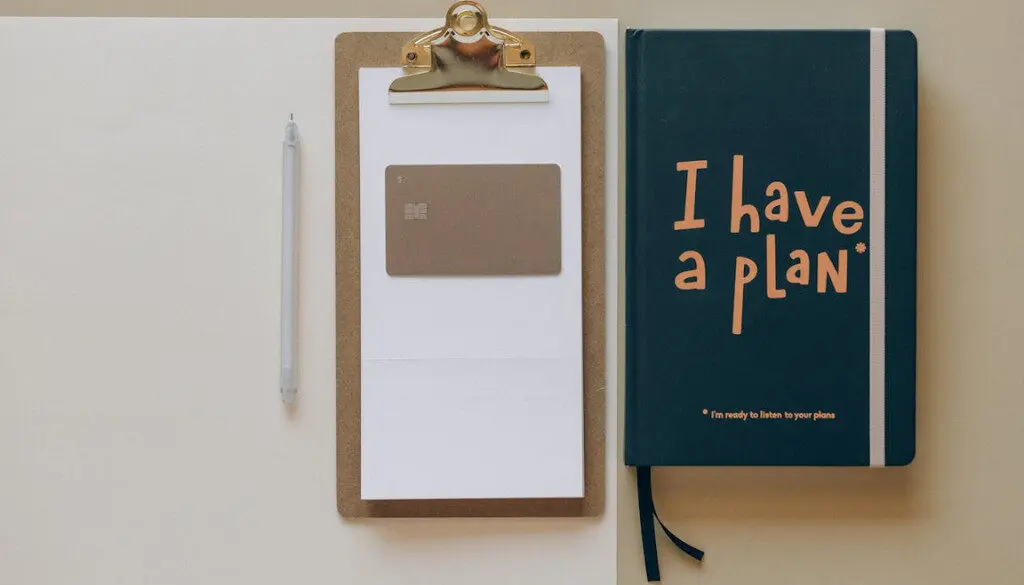Are you looking for fun ways to help your toddler learn? As a busy mom, finding activities that boost early learning is key.
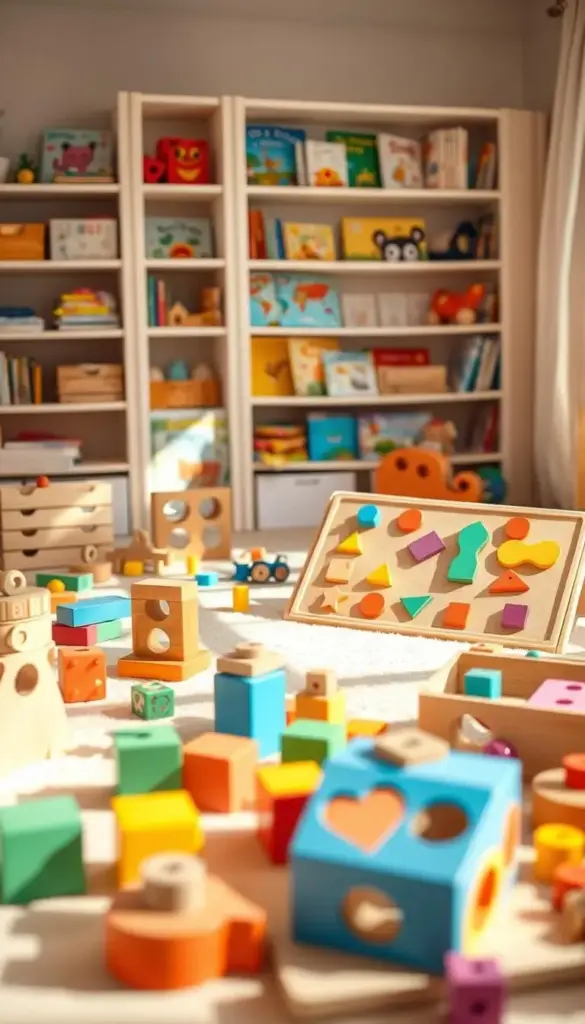
Educational games are great for your child’s growth. They make learning fun and exciting. These games spark curiosity and creativity in young minds.
Adding educational games to your daily life helps create a learning-friendly space. It encourages your toddler to explore and learn more.
Key Takeaways
- Discover the benefits of educational games for toddlers
- Learn how to choose the right games for your child’s age and interests
- Explore fun and interactive activities to enhance early learning
- Understand how to incorporate educational games into your daily routine
- Find practical tips for making learning a enjoyable experience for your toddler
The Power of Play in Toddler Brain Development
Play is key to your child’s brain growth from ages 1-3. It’s not just fun; it shapes their brain. This time is full of growth in thinking, feeling, and moving.
Critical Brain Development Windows Between Ages 1-3
Between 1 and 3, your toddler’s brain grows fast. Many new connections form, setting the stage for learning later. Early learning activities are essential to spark these connections.
Play-based learning is super effective during this time. It’s not just for fun. It’s about helping your child grow their thinking skills. Simple games like peek-a-boo or stacking blocks boost problem-solving and hand-eye coordination.
How Educational Games Stimulate Neural Connections
Educational games help make new connections in your toddler’s brain. They’re made for your child’s age and stage, making learning fun and educational.
| Age Group | Educational Games | Benefits |
|---|---|---|
| 1-2 Years | Shape sorting, simple puzzles | Problem-solving, hand-eye coordination |
| 2-3 Years | Memory games, interactive storytelling | Memory enhancement, language skills |
Adding toddler learning games to your child’s day makes learning fun. It also supports their brain growth. These games are fun and challenging, laying a strong base for school success.
Matching Games to Your Toddler’s Developmental Stage
Toddlers grow at different speeds. Choosing games that match their age helps them learn more. As a parent, picking the right interactive toddler games is key for their growth.
Games for 12-18 Month Toddlers
At this age, toddlers start to explore and love sensory play. Educational toys for toddlers should focus on sensory fun, like:
- Texture balls for tactile exploration
- Music instruments like drums or xylophones
- Stacking cups or blocks for motor skill development
Games for 18-24 Month Toddlers
Toddlers in this age group are curious and start to solve problems. Games can include:
- Simple shape sorters to enhance problem-solving skills
- Play kitchens or doctor’s kits for role-playing
- Push-pull toys for improving motor skills
These games spark creativity and help with complex thinking.
Games for 2-3 Year Old Toddlers
At this stage, children are ready for more challenging activities. Suitable games include:
- Simple puzzles to enhance problem-solving skills
- Memory games with cards or objects
- Building blocks or LEGO DUPLO for creativity and fine motor skills
These activities keep your toddler engaged and prepare them for more advanced learning.
Cognitive Development Games for Curious Minds
As your toddler grows, their curiosity and problem-solving skills can be nurtured with engaging cognitive development games. These activities are designed to challenge young minds and promote cognitive growth. By incorporating these games into your daily routine, you can support your child’s overall development and lay a strong foundation for future learning.
Shape Sorting and Matching Activities
Shape sorting and matching games are excellent for developing problem-solving skills in toddlers. These activities help children understand different shapes, colors, and how to categorize objects. You can use everyday objects like blocks, puzzle pieces, or even create your own shape-sorting game using cardboard cutouts.
To make it more engaging, you can:
- Use different shapes and colors to challenge your child’s understanding.
- Increase the difficulty level by adding more shapes or introducing new ones.
- Make it a timed game to encourage quick thinking.
Simple Puzzles for Problem-Solving Skills
Simple puzzles are another effective way to enhance your toddler’s cognitive abilities. Puzzles help develop critical thinking and problem-solving skills, hand-eye coordination, and spatial awareness. Start with simple puzzles that have a few pieces and gradually move to more complex ones as your child becomes more confident.
Some tips for introducing puzzles:
- Begin with puzzles that have large, easy-to-grasp pieces.
- Encourage your child to solve the puzzle by themselves, but be available to offer guidance when needed.
- Praise their efforts and accomplishments to build confidence.
Memory Games for Toddlers
Memory games are a fun way to improve your toddler’s memory and concentration. These games involve remembering the location of objects or matching identical items. You can create a simple memory game by placing a few toys under cups or using memory match cards.
To make memory games more engaging:
- Start with a few items and gradually increase the number as your child’s memory improves.
- Use a variety of objects or images to keep the game interesting.
- Play the game together and take turns to make it a fun, interactive experience.
Language and Literacy Games to Boost Communication
There are many fun ways to help your toddler learn language and literacy. These games not only improve their communication skills. They also help them do well in school later on.
Interactive Storytelling Games
Interactive storytelling is great for toddlers to learn language. It lets them use their imagination and creativity. Start by reading a story and then ask your child to guess what happens next.
To make it more fun, use different voices for characters. Ask questions about the story. And ask your child to point out pictures.
Rhyming and Song Games for Phonological Awareness
Rhyming and songs are perfect for toddlers to learn phonological awareness. These activities help them understand sounds and rhythms of language. Singing nursery rhymes or making simple songs together is a fun way to do this.
Play games where you find words that rhyme. For example, say a word and ask your child to find a word that rhymes with it.
Vocabulary Building Activities
Building vocabulary is key for language development. You can play games like labeling objects, word-matching, or a “word scavenger hunt”. These activities help your child learn new words.
Reading books together is also great for vocabulary. Point to pictures and say the names of objects or characters. Encourage your child to repeat after you.
By adding these games to your daily routine, you can greatly improve your toddler’s communication skills. This will help them succeed in the future.
Fine Motor Skill Games for Little Fingers
Play is a great way to help your toddler improve fine motor skills. These skills are important for writing, dressing, and using utensils. It’s key to keep your toddler active in games that boost hand-eye coordination and dexterity.
Playdough and Clay Activities
Playdough and clay are perfect for fine motor skill development. They let your toddler shape and mold, improving hand strength and coordination. Making your own playdough with flour, water, and food coloring is easy and fun.
Lacing, Threading, and Beading Games
Lacing, threading, and beading games are excellent for fine motor skills. They require your toddler to thread beads or lace, which boosts precision and hand-eye coordination. You can use wooden or plastic beads for these games.
| Activity | Age Group | Skills Developed |
|---|---|---|
| Playdough | 1.5 – 3 years | Hand strength, coordination |
| Lacing/Threading | 2 – 3 years | Precision, hand-eye coordination |
| Finger Painting | 1.5 – 3 years | Creativity, finger control |
Finger Painting and Art Activities
Finger painting is a fun way to improve fine motor skills. It lets your toddler explore textures and colors while refining finger control. Setting up a space with paper and washable paints is a great way to encourage creativity.
Adding these games to your toddler’s daily routine can help them master more complex tasks. These interactive toddler games are not only educational but also a wonderful way to bond.
Gross Motor Games for Active Toddlers
Help your toddler grow their gross motor skills with fun games. These skills are key for physical activities as they get older. Playing games that help with physical development is good for their health and coordination.
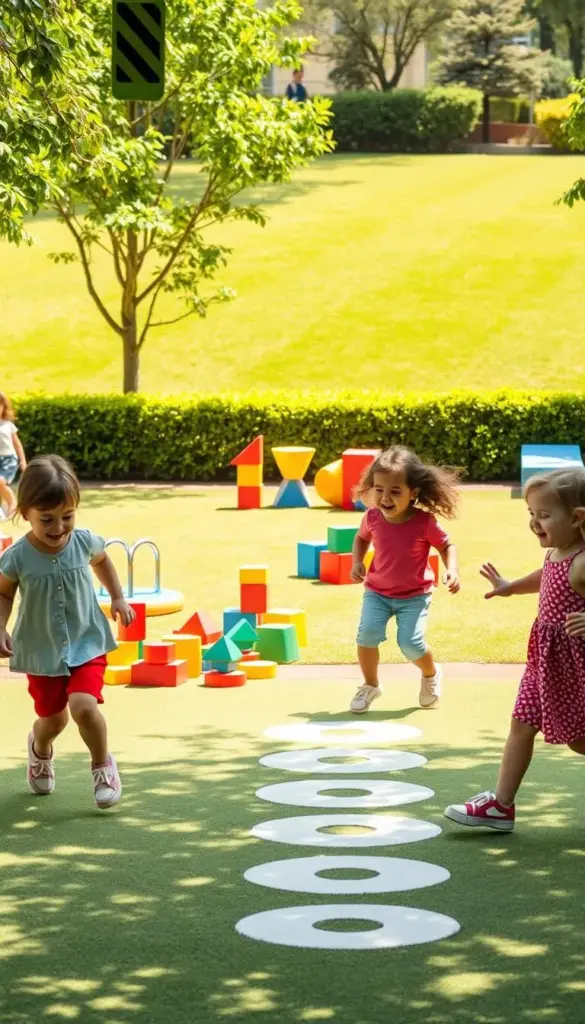
Indoor Movement Games and Obstacle Courses
Indoor games keep your toddler moving, even when it’s rainy outside. Make a mini obstacle course with couch cushions, chairs, and blankets. It’s great for their gross motor skills and problem-solving.
- Create a tunnel with a cardboard box or a blanket over two chairs.
- Set up a series of small hurdles, like books or small boxes, for your child to jump over.
- Use a balance beam or a straight line on the floor for your child to practice balancing.
Outdoor Physical Activities for Coordination
Outdoor play gives your toddler more space to move and learn. Simple games like tag, ball toss, or running improve coordination and balance. Adding preschool educational games makes these activities more fun and educational.
- Play a game of catch to improve hand-eye coordination.
- Organize a simple scavenger hunt that requires your child to run, stop, and change direction.
- Visit a local park or playground and let your child explore different playground equipment.
Music and Dance Games for Rhythmic Movement
Music and dance are great for gross motor skills. Dancing to different rhythms improves timing and coordination. Create a playlist of your child’s favorite songs for a dance party.
- Freeze dance: Dance to music and freeze in place when it stops.
- Follow the leader: Mimic different dance moves or actions.
- Musical march: March around the room or house to the beat.
Adding these games to your toddler’s daily routine boosts physical development. It also makes for fun and bonding moments. The most important thing is to keep it fun and engaging for your child.
Sensory Play Activities That Stimulate Learning
Sensory play, like water play and tactile sensory bins, is great for toddlers. It makes their senses come alive and encourages them to explore. These activities are not just fun; they’re key to early learning and growth.
Water Play Experiments and Activities
Water play is a fantastic way to engage your toddler’s senses. You can set up a water table or use a big tub with water and objects. Adding textures like sponges and toys makes it even better.
Here are some water play ideas:
- Do a “sink or float” experiment with different objects
- Use food coloring to dye the water for a colorful experience
- Add soap or shampoo for a fun and educational sensory bin
Tactile Sensory Bins and Materials
Tactile sensory bins are another great way to engage your toddler’s senses. Fill bins with rice, beans, sand, or shredded paper. Then, hide small toys or objects for your child to find.
Here are some popular materials for tactile sensory bins:
| Material | Description | Benefits |
|---|---|---|
| Rice | Rice is a soothing texture for sensory bins. | Helps improve fine motor skills as children dig and pour. |
| Sand | Sand is great for creating and molding, making it versatile. | Boosts creativity and hand-eye coordination. |
| Beans | Beans offer a different texture and are good for hiding small objects. | Helps improve search and retrieval skills. |
Sound and Music Exploration Games
Sound and music exploration games are great for your toddler’s auditory senses. You can make simple instruments or use household items to create sounds.
Here are some ideas:
- Make a homemade drum with a pot and wooden spoon
- Create shakers with beans or rice inside containers
- Explore different sounds with xylophones or metal instruments
By adding these sensory play activities to your toddler’s routine, you create a rich learning environment. It stimulates their senses and encourages exploration and development.
Social-Emotional Games That Build Confidence
Toddlerhood is a key time for growing social-emotional skills. The right games can help a lot. At this age, kids learn to handle their feelings, get along with others, and feel more confident. Playing interactive toddler games that teach these skills is very important.
It helps them make good friends and feel emotionally strong.
Turn-Taking and Sharing Activities
Learning to take turns and share is very important for toddlers. Simple games like playing catch or sharing a toy teach them to work together and wait patiently. You can also use daily moments, like bath time or eating, to practice these skills.
For example, you can say, “It’s my turn now, then it’s your turn,” while playing or talking.
Here are some fun ways to practice:
- Playing with blocks or stacking toys
- Engaging in a game of rolling a ball
- Using play kitchen or doctor’s office toys to practice sharing
Emotion Recognition and Expression Games
It’s important to help your toddler understand and show their feelings. You can play games that help them spot emotions through faces or stories. For example, you can make different faces in a mirror and ask your child to guess the feeling.
Or, you can read a story and talk about how the characters feel.
Here are some ideas for games about emotions:
- Creating a “feelings chart” with different facial expressions
- Playing “guess the emotion” with pictures or stories
- Using puppets to act out different emotional scenarios
By adding these toddler learning games to your daily life, you can help your child grow important social-emotional skills. These skills will help them a lot as they grow up.
Math and Number Games for Early Numeracy
Math and number games are more than just counting. They lay the groundwork for your toddler’s future in school. Playing these games with your child can be both enjoyable and educational. It helps them develop a lifelong love for math.
Counting Games with Everyday Objects
Counting everyday objects is a simple yet effective way to introduce math to your toddler. You can count toys, blocks, or even the steps you take together. This activity teaches your child about numbers and quantity.
- Count blocks as you stack them.
- Count steps as you walk.
- Count fruit or other snacks.
Size, Shape, and Measurement Activities
Understanding sizes, shapes, and measurements is key for your toddler’s growth. It boosts their spatial awareness and problem-solving skills. You can engage your child in activities that compare sizes and shapes.
| Activity | Description | Learning Outcome |
|---|---|---|
| Sorting Blocks | Sort blocks by shape, size, or color. | Understanding shapes and sizes. |
| Measuring Length | Measure objects using blocks or a ruler. | Understanding measurement concepts. |
| Comparing Sizes | Compare the sizes of different objects. | Developing spatial awareness. |
Pattern Recognition Games
Pattern recognition is a vital math skill. It involves spotting sequences or patterns. You can use objects or colors to create simple patterns and ask your toddler to continue them.
For example, you can create a pattern with blocks: red, blue, red, blue, and ask your child to continue it.
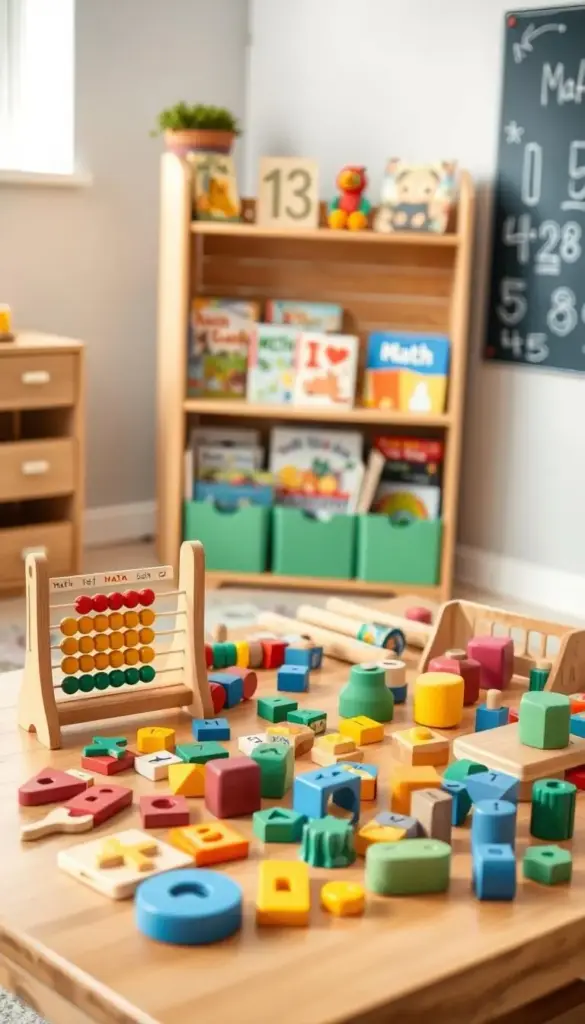
By adding these math and number games to your daily routine, you can strengthen your toddler’s early numeracy skills. The most important thing is to keep learning fun and engaging.
Science and Nature Exploration for Toddlers
Science and nature are key for toddlers, sparking curiosity and a love for the world. As a parent, you’re key in nurturing this curiosity with fun activities.
Simple Science Experiments for Toddlers
Simple science experiments are a great way to introduce science to toddlers. For instance, making a homemade lava lamp is fun. You need vegetable oil, water, food coloring, and Alka-Seltzer tablets. It teaches about density and is visually engaging.
Another fun one is the baking soda volcano. Mixing baking soda with vinegar creates a chemical reaction that looks like a volcano eruption. It helps your toddler learn to observe and predict.
| Experiment | Materials | Learning Outcome |
|---|---|---|
| Homemade Lava Lamp | Vegetable oil, water, food coloring, Alka-Seltzer tablets | Density and buoyancy |
| Baking Soda Volcano | Baking soda, vinegar, clay, container | Chemical reactions and geological processes |
Nature Scavenger Hunts and Outdoor Learning
Nature scavenger hunts are great for toddlers to explore and love nature. Make a list of items to find, like leaves and rocks. It boosts observation skills and understanding of nature.
Outdoor learning is more than scavenger hunts. Gardening is a great activity. Toddlers learn about plants and the joy of nurturing life.
- Observe the changes in plants over time
- Learn about different types of flora and fauna
- Understand the role of seasons in nature
By adding science and nature to your toddler’s daily life, you’re not just teaching them. You’re also sparking a lifelong love for learning.
Engage Your Toddler with These Educational Games That Encourage Early Learning Through Technology
In today’s world, technology is a great way to help your toddler learn. There are many educational apps and games out there. They can give your child a boost in learning and thinking skills.
Age-Appropriate Educational Apps and Digital Games
Choosing the right apps and games for your toddler is important. Look for ones that are fun and teach something new. Apps like Piknik, Pok Pok, and Lingokids are great. They help with skills like language, reading, solving problems, and being creative.
When picking educational apps, look for these features:
- Interactive elements that encourage engagement
- Adaptive technology that adjusts to your child’s learning pace
- Content that aligns with your child’s developmental stage
- Positive reinforcement and rewards for achievements
Experts say that the right digital tools can make learning fun for toddlers. — Expert in Child Development
“The key is to ensure that screen time is balanced with other forms of play and interaction.”
Balancing Screen Time with Hands-On Learning
Technology is a valuable tool for learning, but it’s important to balance it. Too much screen time can hurt physical and social skills. Make sure your toddler has time for hands-on learning too.
To find a good balance, try these tips:
- Set limits on screen time and prioritize hands-on activities
- Choose apps that complement physical play, such as those that encourage outdoor exploration
- Engage in co-play with your toddler, using technology as a tool for interactive learning
By mixing technology with traditional play, you can create a great learning environment. This supports your toddler’s growth in many ways.
Conclusion: Creating a Consistent Learning Through Play Routine
You’ve learned how educational games can keep your toddler engaged and learning early. Now, it’s time to make these games a part of their daily routine. Consistency is key for learning through play. A regular routine helps your toddler grow and sets them up for success later on.
To start a consistent routine, set aside time each day for play. Mix and match different games and activities to keep things interesting. For example, mornings can be for games that challenge their brain, like puzzles. Afternoons can be for physical activities, like playing outside or dancing.
Sticking to a regular routine gives your toddler a fun and educational experience. It supports their growth and helps them love learning. Use these games to engage your toddler and watch them grow and thrive.


